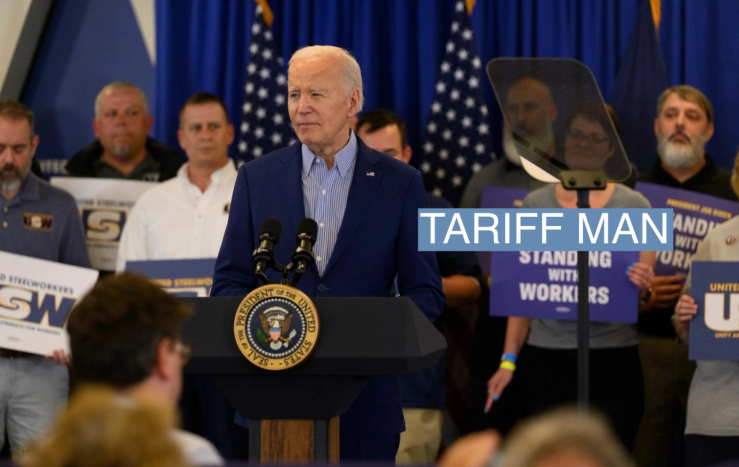The News
President Joe Biden will announce plans Tuesday to dramatically raise tariffs on Chinese-made electric cars and other high-tech goods, arguing that they are necessary to protect fledgling US industries from a flood of unfairly priced imports.
The tariffs cover $18 billion in goods in sectors where the Biden administration has focused billions in public investments. Administration officials described the tariffs as “targeted” and insisted they would not contribute to inflation.
Biden will lay out the plans during a speech at the White House Tuesday afternoon, as he girds for a reelection campaign against former President Donald Trump, who made tariffs on China a central focus of his economic policy while in the White House.
“The president knows it is vital to invest in American manufacturing and workers and to enforce our trade laws to give our workers and businesses a fair chance to compete,” White House National Economic Council director Lael Brainard said on a call with reporters previewing the announcement. The moves, she added, would ensure that US investments “are not undercut by a flood of unfairly underpriced exports from China.”
The decision followed a lengthy review of tariffs put in place during the Trump administration undertaken by U.S. Trade Representative Katherine Tai. Biden had already called for tripling tariffs on Chinese steel and aluminum, but Tuesday’s actions are much broader. Biden is also maintaining the Trump-era tariffs, a senior Biden administration official said.
In this article:
Know More
Under the new plans, Biden is directing Tai to increase Section 301 tariffs across a range of Chinese goods, including semiconductors, electric vehicles, batteries and their components, critical minerals, solar cells, and ship-to-shore cranes. Chinese electric vehicles would see the steepest increase in penalties, moving from 25% tariffs to 100% this year, according to a White House fact sheet. Some of the new tariffs, particularly those on batteries, won’t kick in until 2026.
The announcement is expected to trigger backlash from China, which has criticized the administration’s complaints about Beijing’s industrial “overcapacity.”
“Hopefully we will not see a significant Chinese response — but that’s always a possibility,” Yellen told Bloomberg Television on Monday, ahead of Biden’s announcement.
“I don’t think it’s going to lead to any change in behavior on China’s part,” Bonnie Glaser, managing director of the German Marshall Fund’s Indo-Pacific program, told Semafor of the tariffs. “It is going to certainly lead to greater friction with China.”
Step Back
The Biden administration has sought to open up more lines of communication with China, even as it has moved to aggressively respond to what it says are unfair trade practices by Beijing. US officials say those channels are key to managing a tense and complicated bilateral relationship. Indeed, Biden’s announcement is coming the same day as US and Chinese delegations meet in Geneva for conversations about safety of artificial intelligence systems.
While one senior administration official insisted the tariffs have “nothing to do with politics,” Biden has a political incentive to keep up economic pressure on China, which is viewed unfavorably by an increasing number of Americans. Trump has floated a 10% tariff on all imports — an idea Biden officials have panned — and 60% tariffs on goods from China.
Brainard made a point to criticize the Trump administration’s “phase one” trade deal with China as failing to “deliver on its promises” and said proposals for across-the-board tariffs would raise costs on Americans.
But the penalties will also prove controversial in environmental circles, with some climate advocates worrying that they could impede US efforts to accelerate the transition to clean energy.
The View From EUROPE
The US isn’t the only country looking at raising tariffs on China: The European Union also recently said it found evidence that Chinese subsidies were illegally fueling electric vehicles being exported to the bloc, moving closer to imposing new tariffs on the goods.


